For the second year running there were three prizes in the Special Class. These coveted awards single out the very best from across the 200-plus entries in this year's competition. Here are details of the winners.
Clinician's Choice Award
Winner:
Sonnemann Toon Architects for the European Scanning Centre
One of the most-sought-after awards each year, the Clinician’s Choice accolade is this year presented to the European Scanning Centre, designed by Sonnemann Toon Architects.
Category judge, Dr Roy MacGregor, said of the entry: “This is a wonderful scheme that, instead of just utilising artwork to relax patients, actually reflects the scientific and technical nature of radiology equipment and services. It is taking technology to the nth degree.”
The European Scanning Centre project created two imaging suites of distinct character, each complementing the particular state-of-the-art scanner at its centre.
The guiding principle of design was an absolute focus on the patient experience and creation of a space where the ambience reinforced the expectation of first-class treatment.
A bespoke chromatic light installation was an integral part of the concept which, together with the ability for patients to stand rather than being confined to an enclosed horizontal position.
With the gentle changing light bringing the interiors to life, the space offers a full sensory experience in a harmonious and therapeutic environment.
A sophisticated colour palette and variety of textures and finishes adds a soft touch to the building, blending with existing patient areas leading from the Harley Street entrance, which are quiet, private and warm, with a hotel-like character.
A spokesman at the centre said: “Positive feedback from patients has confirmed we have created a truly therapeutic environment. Furthermore, within the first six months of use the combination of scanning modalities has already allowed the discovery of a new musculoskeletal condition. Health and great design have truly come together.”
Patient’s Choice Award
Winner:
LIME Arts for the Starship X-ray department at the Royal Manchester Children’s Hospital
The positive impact of good interior design and inclusion of the arts is highlighted by this year’s winner of the Patient’s Choice Award.
Category judge, Danny Daniels, said of his choice: “This is a truly an exciting development in the field of enhancing the patient experience.”
The winner is Starship X-ray, an interior design makeover of the radiology department at Manchester Children’s Hospital.
Funded by the Thomas Cook Children’s Charity and designed by LIME Art, Starship X-ray is an art and design project that has created a child-friendly therapeutic space aimed at promoting relaxation during often lengthy and upsetting procedures.
For the unit, staff and children requested the theme of ‘Space’. There are nine camera rooms in the department and nine planets in the solar system. Each room has now become a planet, for example Neptune is the Planet of Oceans and Jupiter the Planet of Magnetism. The latter is within the MRI suite, the MRI itself being a powerful magnet.
The transformation is already having a huge impact on patient care and saving staff time as it provides a useful distraction for children.
A radiologist working in the department said: “The light box that has been installed in the CT room came into its own the day after it went in when we had a young boy who had previously struggled to stay on the scanner lie quietly and count the butterflies and monkeys. His mum was nearly in tears as what had previously been a traumatic experience for them both was completed with ease and he came away smiling for the first time.”
Danny added: “It is obvious that the patient target – i.e. children within the hospital environment - were the primary drivers for the project.
“The whole scheme is an exemplar which beautifully demonstrates that the children’s experiences encountered within a clinical environment can be a memorable occasion.”
Highly commended:
RHP for St Wilfrid’s Hospice – breaking down barriers
With so many high-quality entries for this year’s awards, Danny has also chosen to highly commend one project.
St Wilfrid’s Hospice cares for more than 1,000 patients every year who are living with a life-limiting illness.
The new hospice building was completed in August 2013 and was the biggest project the charity had undertaken in its 30-year history.
Members of the patient forum played an important role in agreeing the designs, checking the new policies and services, and defining the overall vision. The patient promise, written by the forum, is now featured prominently on a wall of the inpatient unit.
The architecture of the hospice has been designed to change the way people think about end-of-life care environments.
The entrance opens up to a high ceiling, with glass that allows the light to stream into what is known as The Street. This is home to a café and the space is also used to host events designed to bring the community into the building.
The building also has a number of features to meet sustainable objectives such as a living roof to prevent heat loss, solar heating to provide hot water, natural ventilation systems, and low-volume flushing toilets.
Another innovative feature is the absence of a reception desk - underpinning the hospice’s philosophy of a ‘building without barriers’.
Commenting on the entry, Danny said: “I was struck by the ethos of this project. Patient wellbeing is at the core of the hospice culture and patient consultation appears to be a major driver in realising the successful development of this project.”
Innovations in Procure21+
The judges considered:
Willmott Dixon& partners for Queen Victoria Hospital, East Grinstead
The new peri-operative suite at Queen Victoria Hospital, procured via P21+, has transformed theatre services by providing an integrated facility that enhances patient and staff experience.
The project successfully brought together Willmott Dixon and the hospital, which is famed for the innovative and life-changing reconstructive surgery that was performed on airmen injured in World War II.
The new facility replaces outdated theatres developed in a piecemeal fashion over many years. The redevelopment embedded 10 new operating theatres over two phases within a well-designed, patient-centred, peri-operative suite.
Clinicians and other stakeholders were fully involved in a design that encompasses all stages of the patient journey, from admission to discharge, creating operational and cost efficiencies and making best use of specialist equipment and staff.
The open-book ethos of P21+ facilitated the close collaboration necessary for a successful development, and the early use of Building Information Modelling facilitated standardisation and full co-ordination across the design team.
Data evidencing the impact of the new facility shows that capacity has increased by a third, and staff report huge improvements, mainly as a result of having all facilities under one roof.
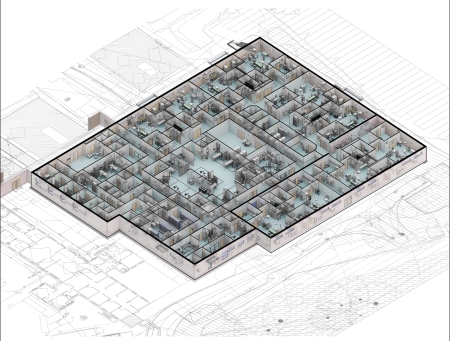
Balfour Beatty & partners for Royal Cornwall Hospitals’ laparoscopic theatres refurbishment programme
The Royal Cornwall NHS Hospitals Trust’s business case called for for a radical change in surgical services, upgrading from portable laparoscopic equipment to five fully-refurbished integrated theatres and enhancing surgical preparation areas, patient receptions and staff amenities.
This work would create the largest laparoscopic service outside of the major UK teaching centres.
The team was challenged to provide assurance and certainty across a programme of complex refurbishment within live environments at Penzance and Truro hospitals.
The first theatre was in service after just 11 weeks at a cost of £3,500 per square metre. Following lessons learnt reviews and targeted improvements, at completion of the fifth theatre the programme period had been reduced to six weeks and comparable costs were reduced by 20%. In particular, it was the certainty the team gave to clinicians planning theatre schedules that was crucial to the trust achieving waiting times during the delivery of the project.
Nigel McArthur of principal supply chain partner, Balfour Beatty, said: “The outcome is a demonstration of how the flexibility of P21+ enables delivery with confidence, managing the uncertainties inherent in refurbishment and reacting to clinical needs, while achieving demonstrable improvement in time, cost and quality.
“The ambitious step change in surgical delivery has enhanced both the patient experience and outcomes, with a remarkable 21% improvement in clinical productivity.”
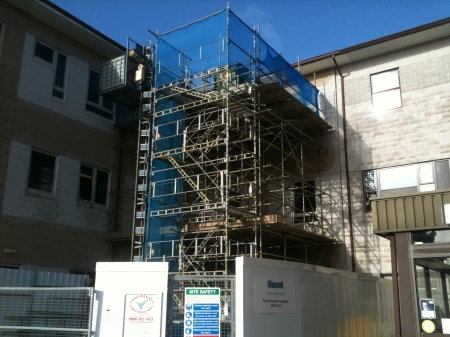
Balfour Beatty and partners entered the Royal Cornwall Hospitals laparoscopic theatres refurbishment programme
Kier Group & partners for North Middlesex University Hospital BEH clinical strategy
The Barnet, Enfield and Haringey Clinical Strategy proposes to integrate the emergency, planned and specialist services across three hospital sites: North Middlesex University Hospital, Chase Farm Hospital, and Barnet General Hospital.
The changes will ensure that hospital facilities, healthcare services and clinical staff are based in the most-appropriate places to offer the best-possible care to people across this part of London.
The first element of the clinical strategy was the redevelopment of North Middlesex University Hospital to upgrade stroke and HIV services and retained estate to increase bed capacity and upgrade to modern healthcare standards. This work was carried out in parallel with the provision of a new women’s and children’s centre, allowing the transfer of maternity and paediatrics from Chase Farm Hospital.
The scheme has been developed jointly with North Middlesex University Hospital NHS Trust following user group meetings.
Interserve & partners for The Walton Centre ‘Fabric First’
Interserve has taken an innovative approach to the construction of a new building for The Walton Centre.
Its ‘Fabric First’ system draws on Interserve’s Passivhaus experience, adopting skills, competences and details to promote passive heating and ventilation and achieve better air tightness, which together with the choice of external fabric makes the building more energy efficient, reducing energy consumption and therefore energy costs.
Interserve presented the client with seven fabric alternatives, ranging from meeting Part L of the building regulations, to full Passivhaus standards. The team demonstrated that a hybrid solution would offer best value for money and improve certainty of delivery.
The client opted for a fabric solution which improved the building fabric U values by 20% for an additional capital cost of £200,000, reduced to £100,000 by savings in the cost of M&E services. This would be paid back in less than five years. This option will also enable a 41% reduction in fabric loss heat, a 29% reduction in carbon emissions, and a 15% reduction in overall energy usage.
Phil Shaw, construction director at Interserve Construction, said: “There is always a challenge when balancing economic constraints and the desire and requirement to reduce carbon emissions. Our ‘Fabric First’ approach gives a client informed choices from which to make a decision based on a holistic, costed design solution.”
Stuart Moore, director of strategy and planning at The Walton Centre NHS Foundation Trust, added: “As a client we have been far better equipped to make informed decisions in balancing affordability criteria, giving us the confidence to make additional capital investment to generate savings in operational costs, to then reinvest in patient care.”

The Walton Centre
Ove Arup & Partners for Colchester General Hospital radiotherapy reprovision
This new radiotherapy unit has been designed to provide a much-needed cancer treatment facility to the people of Essex.
The 3,200sq m, two-floor building is an extension to the existing Colchester General Hospital, creating an improved link between departments. It will house five new linear accelerators, bunkers for radiation treatment equipment, a new brachytherapy facility, a new orthovoltage facility, and a CT scanner facility.
One of the keys to the success of the design stage was in creating a strong working relationship between all the parties in various UK locations.
The hospital has achieved BREEAM excellent in the design stage and is on course to maintain this level through the construction phase. This has been achieved through a combination of excellent fabric performance, low-energy MEP system design, micro CHP, and photovoltaics.
IHP for Lister Macmillan
Integrated Health Partnerships (IHP) has been working with East and North Herts NHS Trust for four years on a scheme including the creation of a new emergency department, theatres and wards and a chemotherapy unit.
The new cancer centre is in a prominent position next to the main entrance, raising the profile of cancer treatment in the community. It has 11 outpatient consulting rooms, 18 treatment bays, and a separate phlebotomy room providing point-of-care blood testing and toxicity assessments.
The improved layout allows staff to cohort certain treatment types enabling efficiencies in staffing, and the 8-6-4 bay layout will enable the separation of young people from adults when receiving treatment.
The strategic aim of the trust was to deliver cancer services to the heart of the community, reducing travel distances for consultations and treatment.
In total, 38 nurses, patient representatives, volunteers, medical staff and the Macmillan planning team were all involved in the design of the new centre.
Patient representative, Eunice Sebly, said: “What an amazing workplace. It’s everything the staff wanted to make the patients’ lives that bit easier. I wouldn’t want to have to use such facilities again, but if patients need to then this is the best place to come”
IHP has conducted post-occupancy evaluations with the trust board, the clinical management team, clinical staff and patients, volunteers and donors. The clinical staff also record patient and staff comments.
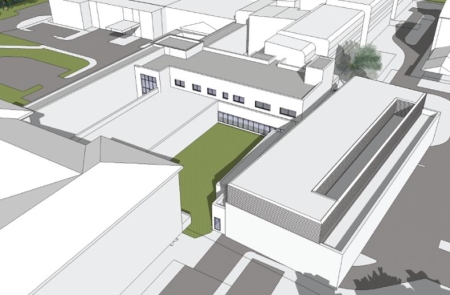
Colchester General Hospital
Winner:
P+HS Architects & partners for estates improvements at South Tees Hospitals NHS Foundation Trust
South Tees Hospitals NHS Foundation Trust has utilised a unique partnership arrangement to successfully deliver more than £62m worth of schemes via the P21/P21+ framework, enabling both innovation and economies across its entire estate.
In 2003 the trust identified Interserve as its preferred partner under the P21 framework for the delivery of a new £21m scheme to improve women’s and children’s services and pathology and pharmacy facilities at The Friarage Hospital in Northallerton, North Yorkshire.
Since that time Interserve has remained the trust’s principal supply chain partner of choice to deliver over 15 projects with a combined value of approximately £62m on both the main hospital site at The Friarage and at James Cook University Hospital in Middlesbrough.
Uniquely under the P21+ framework, the trust and Interserve have formed a partnership with the PFI concessionaire, Endeavour, and FM provider, Carillion, to deliver a highly-bespoke series of capital schemes together with hard FM services, including the backlog maintenance programme for the entire estate. This fully-collaborative approach allows the team to ensure that all schemes, whether new build, refurbishment or maintenance projects, are fully co-ordinated and constitute exceptional value for money for the NHS.
This unique relationship and approach to development also avoids the potential for any conflict regarding future maintenance and plant replacement as the design and specification of all components have been fully agreed by all parties. It also fully considers lifecycle costing implications, again ensuring best value in the future for the trust.
The judges praised the entry for setting an exemplar for cross-party working and for ensuring value for money for the NHS.
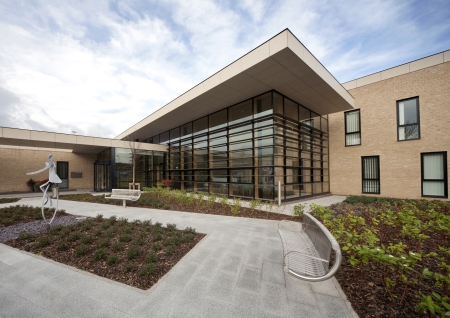
P+HS Architects & partners won the Innovation in ProCure21+ for estates improvements at South Tees Hospitals NHS Foundation Trust
Highly commended:
IHP for Bridgwater Community Hospital
“This is a well-thought-out, comprehensive facility that enhances the patient experience.”
This is how the judges described the new Bridgwater Community Hospital, which was highly commended in the Innovations in ProCure21+ category.
Bridgwater Hospital was designed and constructed during a period of significant change in the NHS, which created significant organisational obstacles. These were overcome through the flexibility of the NEC contract and the ProCure21+ process, resulting in a building which admirably meets the demands of 21st-century healthcare.
Responsibility for the project has moved through three NHS organisations during the construction and it is very unlikely that it would have proceeded without the benefits of a Guaranteed Maximum Price having been agreed at an early stage, which gave future organisations confidence of the total costs they would face.
The design of the hospital emphasises the use of natural light and ventilation and is planned around an internal courtyard with generous areas of glazing. It also recognises the increasing incidence of dementia and the project team worked with the trust’s specialist advisors to incorporate a range of dementia-friendly ideas to reduce confusion and stress.
"Patients and staff love the new building,” said Sue Taylor, matron at Bridgwater Community Hospital.
"It has made the staff realise just how sick and tired the old building really was. It is a pleasure to come to work and the terrace in the sunshine is a real hit.”
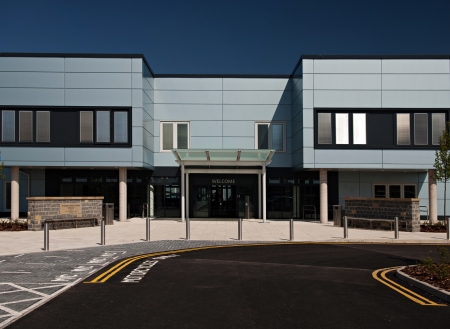
Bridgwater Community Hospital




